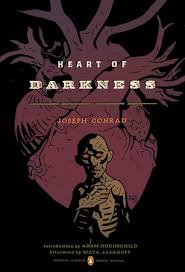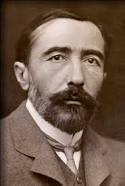Heart of Darkness Page #22
Heart of Darkness is a novella by Polish-British novelist Joseph Conrad, about a voyage up the Congo River into the Congo Free State, in the heart of Africa, by the story's narrator Charles Marlow.
“They had come together unavoidably, like two ships becalmed near each other, and lay rubbing sides at last. I suppose Kurtz wanted an audience, because on a certain occasion, when encamped in the forest, they had talked all night, or more probably Kurtz had talked. 'We talked of everything,' he said, quite transported at the recollection. 'I forgot there was such a thing as sleep. The night did not seem to last an hour. Everything! Everything!... Of love, too.' 'Ah, he talked to you of love!' I said, much amused. 'It isn't what you think,' he cried, almost passionately. 'It was in general. He made me see things--things.' “He threw his arms up. We were on deck at the time, and the headman of my wood-cutters, lounging near by, turned upon him his heavy and glittering eyes. I looked around, and I don't know why, but I assure you that never, never before, did this land, this river, this jungle, the very arch of this blazing sky, appear to me so hopeless and so dark, so impenetrable to human thought, so pitiless to human weakness. 'And, ever since, you have been with him, of course?' I said. “On the contrary. It appears their intercourse had been very much broken by various causes. He had, as he informed me proudly, managed to nurse Kurtz through two illnesses (he alluded to it as you would to some risky feat), but as a rule Kurtz wandered alone, far in the depths of the forest. 'Very often coming to this station, I had to wait days and days before he would turn up,' he said. 'Ah, it was worth waiting for!--sometimes.' 'What was he doing? exploring or what?' I asked. 'Oh, yes, of course'; he had discovered lots of villages, a lake, too--he did not know exactly in what direction; it was dangerous to inquire too much--but mostly his expeditions had been for ivory. 'But he had no goods to trade with by that time,' I objected. 'There's a good lot of cartridges left even yet,' he answered, looking away. 'To speak plainly, he raided the country,' I said. He nodded. 'Not alone, surely!' He muttered something about the villages round that lake. 'Kurtz got the tribe to follow him, did he?' I suggested. He fidgeted a little. 'They adored him,' he said. The tone of these words was so extraordinary that I looked at him searchingly. It was curious to see his mingled eagerness and reluctance to speak of Kurtz. The man filled his life, occupied his thoughts, swayed his emotions. 'What can you expect?' he burst out; 'he came to them with thunder and lightning, you know--and they had never seen anything like it--and very terrible. He could be very terrible. You can't judge Mr. Kurtz as you would an ordinary man. No, no, no! Now--just to give you an idea--I don't mind telling you, he wanted to shoot me, too, one day--but I don't judge him.' 'Shoot you!' I cried 'What for?' 'Well, I had a small lot of ivory the chief of that village near my house gave me. You see I used to shoot game for them. Well, he wanted it, and wouldn't hear reason. He declared he would shoot me unless I gave him the ivory and then cleared out of the country, because he could do so, and had a fancy for it, and there was nothing on earth to prevent him killing whom he jolly well pleased. And it was true, too. I gave him the ivory. What did I care! But I didn't clear out. No, no. I couldn't leave him. I had to be careful, of course, till we got friendly again for a time. He had his second illness then. Afterwards I had to keep out of the way; but I didn't mind. He was living for the most part in those villages on the lake. When he came down to the river, sometimes he would take to me, and sometimes it was better for me to be careful. This man suffered too much. He hated all this, and somehow he couldn't get away. When I had a chance I begged him to try and leave while there was time; I offered to go back with him. And he would say yes, and then he would remain; go off on another ivory hunt; disappear for weeks; forget himself amongst these people--forget himself--you know.' 'Why! he's mad,' I said. He protested indignantly. Mr. Kurtz couldn't be mad. If I had heard him talk, only two days ago, I wouldn't dare hint at such a thing.... I had taken up my binoculars while we talked, and was looking at the shore, sweeping the limit of the forest at each side and at the back of the house. The consciousness of there being people in that bush, so silent, so quiet--as silent and quiet as the ruined house on the hill--made me uneasy. There was no sign on the face of nature of this amazing tale that was not so much told as suggested to me in desolate exclamations, completed by shrugs, in interrupted phrases, in hints ending in deep sighs. The woods were unmoved, like a mask--heavy, like the closed door of a prison--they looked with their air of hidden knowledge, of patient expectation, of unapproachable silence. The Russian was explaining to me that it was only lately that Mr. Kurtz had come down to the river, bringing along with him all the fighting men of that lake tribe. He had been absent for several months--getting himself adored, I suppose--and had come down unexpectedly, with the intention to all appearance of making a raid either across the river or down stream. Evidently the appetite for more ivory had got the better of the--what shall I say?--less material aspirations. However he had got much worse suddenly. 'I heard he was lying helpless, and so I came up--took my chance,' said the Russian. 'Oh, he is bad, very bad.' I directed my glass to the house. There were no signs of life, but there was the ruined roof, the long mud wall peeping above the grass, with three little square window-holes, no two of the same size; all this brought within reach of my hand, as it were. And then I made a brusque movement, and one of the remaining posts of that vanished fence leaped up in the field of my glass. You remember I told you I had been struck at the distance by certain attempts at ornamentation, rather remarkable in the ruinous aspect of the place. Now I had suddenly a nearer view, and its first result was to make me throw my head back as if before a blow. Then I went carefully from post to post with my glass, and I saw my mistake. These round knobs were not ornamental but symbolic; they were expressive and puzzling, striking and disturbing--food for thought and also for vultures if there had been any looking down from the sky; but at all events for such ants as were industrious enough to ascend the pole. They would have been even more impressive, those heads on the stakes, if their faces had not been turned to the house. Only one, the first I had made out, was facing my way. I was not so shocked as you may think. The start back I had given was really nothing but a movement of surprise. I had expected to see a knob of wood there, you know. I returned deliberately to the first I had seen--and there it was, black, dried, sunken, with closed eyelids--a head that seemed to sleep at the top of that pole, and, with the shrunken dry lips showing a narrow white line of the teeth, was smiling, too, smiling continuously at some endless and jocose dream of that eternal slumber.
Translation
Translate and read this book in other languages:
Select another language:
- - Select -
- 简体中文 (Chinese - Simplified)
- 繁體中文 (Chinese - Traditional)
- Español (Spanish)
- Esperanto (Esperanto)
- 日本語 (Japanese)
- Português (Portuguese)
- Deutsch (German)
- العربية (Arabic)
- Français (French)
- Русский (Russian)
- ಕನ್ನಡ (Kannada)
- 한국어 (Korean)
- עברית (Hebrew)
- Gaeilge (Irish)
- Українська (Ukrainian)
- اردو (Urdu)
- Magyar (Hungarian)
- मानक हिन्दी (Hindi)
- Indonesia (Indonesian)
- Italiano (Italian)
- தமிழ் (Tamil)
- Türkçe (Turkish)
- తెలుగు (Telugu)
- ภาษาไทย (Thai)
- Tiếng Việt (Vietnamese)
- Čeština (Czech)
- Polski (Polish)
- Bahasa Indonesia (Indonesian)
- Românește (Romanian)
- Nederlands (Dutch)
- Ελληνικά (Greek)
- Latinum (Latin)
- Svenska (Swedish)
- Dansk (Danish)
- Suomi (Finnish)
- فارسی (Persian)
- ייִדיש (Yiddish)
- հայերեն (Armenian)
- Norsk (Norwegian)
- English (English)
Citation
Use the citation below to add this book to your bibliography:
Style:MLAChicagoAPA
"Heart of Darkness Books." Literature.com. STANDS4 LLC, 2024. Web. 24 Nov. 2024. <https://www.literature.com/book/heart_of_darkness_11>.




Discuss this Heart of Darkness book with the community:
Report Comment
We're doing our best to make sure our content is useful, accurate and safe.
If by any chance you spot an inappropriate comment while navigating through our website please use this form to let us know, and we'll take care of it shortly.
Attachment
You need to be logged in to favorite.
Log In